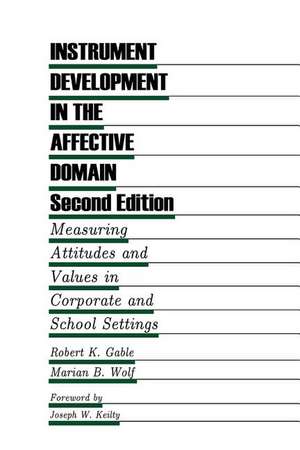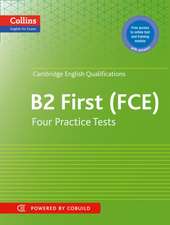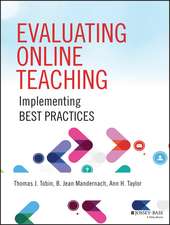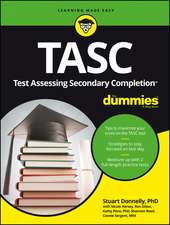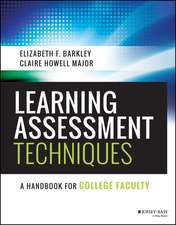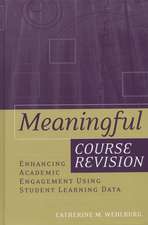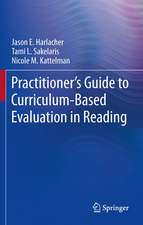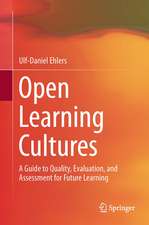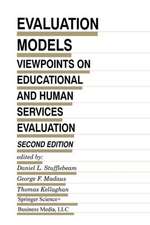Instrument Development in the Affective Domain: Measuring Attitudes and Values in Corporate and School Settings: Evaluation in Education and Human Services, cartea 36
Autor Robert K. Gable, Marian B. Wolfen Limba Engleză Paperback – 6 oct 2012
Din seria Evaluation in Education and Human Services
- 18%
 Preț: 952.57 lei
Preț: 952.57 lei - 20%
 Preț: 335.52 lei
Preț: 335.52 lei -
 Preț: 387.96 lei
Preț: 387.96 lei - 15%
 Preț: 641.71 lei
Preț: 641.71 lei - 15%
 Preț: 707.63 lei
Preț: 707.63 lei -
 Preț: 388.52 lei
Preț: 388.52 lei -
 Preț: 384.86 lei
Preț: 384.86 lei - 15%
 Preț: 648.56 lei
Preț: 648.56 lei -
 Preț: 382.95 lei
Preț: 382.95 lei - 15%
 Preț: 645.60 lei
Preț: 645.60 lei -
 Preț: 387.96 lei
Preț: 387.96 lei -
 Preț: 397.16 lei
Preț: 397.16 lei -
 Preț: 387.75 lei
Preț: 387.75 lei -
 Preț: 388.52 lei
Preț: 388.52 lei -
 Preț: 389.88 lei
Preț: 389.88 lei - 15%
 Preț: 643.34 lei
Preț: 643.34 lei -
 Preț: 383.33 lei
Preț: 383.33 lei - 15%
 Preț: 584.76 lei
Preț: 584.76 lei - 15%
 Preț: 648.24 lei
Preț: 648.24 lei - 18%
 Preț: 1224.68 lei
Preț: 1224.68 lei - 18%
 Preț: 958.38 lei
Preț: 958.38 lei -
 Preț: 392.21 lei
Preț: 392.21 lei - 15%
 Preț: 644.30 lei
Preț: 644.30 lei - 15%
 Preț: 646.43 lei
Preț: 646.43 lei - 18%
 Preț: 1231.64 lei
Preț: 1231.64 lei -
 Preț: 388.72 lei
Preț: 388.72 lei - 18%
 Preț: 1227.04 lei
Preț: 1227.04 lei - 15%
 Preț: 646.43 lei
Preț: 646.43 lei -
 Preț: 394.12 lei
Preț: 394.12 lei - 15%
 Preț: 644.95 lei
Preț: 644.95 lei - 15%
 Preț: 650.19 lei
Preț: 650.19 lei -
 Preț: 390.25 lei
Preț: 390.25 lei
Preț: 640.55 lei
Preț vechi: 753.60 lei
-15% Nou
Puncte Express: 961
Preț estimativ în valută:
122.57€ • 128.31$ • 101.42£
122.57€ • 128.31$ • 101.42£
Carte tipărită la comandă
Livrare economică 05-19 aprilie
Preluare comenzi: 021 569.72.76
Specificații
ISBN-13: 9789401046145
ISBN-10: 940104614X
Pagini: 296
Ilustrații: XVII, 275 p.
Dimensiuni: 155 x 235 x 16 mm
Greutate: 0.42 kg
Ediția:2nd ed. 1993
Editura: SPRINGER NETHERLANDS
Colecția Springer
Seria Evaluation in Education and Human Services
Locul publicării:Dordrecht, Netherlands
ISBN-10: 940104614X
Pagini: 296
Ilustrații: XVII, 275 p.
Dimensiuni: 155 x 235 x 16 mm
Greutate: 0.42 kg
Ediția:2nd ed. 1993
Editura: SPRINGER NETHERLANDS
Colecția Springer
Seria Evaluation in Education and Human Services
Locul publicării:Dordrecht, Netherlands
Public țintă
ResearchCuprins
1 Affective Characteristics in School and Corporate Environments: Their Conceptual Definitions.- School Environment.- Corporate Environment.- What are Affective Characteristics?.- Types of Affective Characteristics.- Attitudes.- Self-Efficacy.- Values.- Self-Concept.- Interest.- Relationships Among the Affective Characteristics.- Additional Readings.- 2 Constructing Affective Instruments.- Operational Definitions.- The Domain-Referenced Approach.- Item Content Sources.- Summary.- 3 Scaling Affective Characteristics.- Measurement.- Fishbein’s Expectancy-Value Model.- Thurstone Equal-Appearing Interval Scale.- Likert’s Summated Rating Techniques.- Latent Trait Models.- Semantic-Differential Scales.- Fishbein’s Expectancy-Value Model: An Illustration.- Ipsative Versus Normative Scale Properties.- Ipsative Measures.- Normative Measures.- An Illustration.- Summary.- Additional Readings.- 4 The Validity of Affective Instruments.- Validity Evidence.- Content Validity.- Construct Validity.- Correlation.- Factor Analysis.- SPSSX Exploratory Factor Analysis.- Computer Output: Expoloratory Factor Analysis.- Confirmatory Factor Analysis.- Computer Output: Confirmatory Factor Analysis.- Multitrait-Multimethod Matrix.- Causal Modeling.- Rasch Latent Trait Analysis.- Item Bias.- Known Groups.- Criterion-Related Validity.- Summary.- Additional Readings.- 5 The Reliability of Affective Instruments.- Reliability Theory.- Sources of Error: Generalizability Theory.- Types of Reliability Coefficients.- Factors Affecting Reliability.- Acceptable Levels of Reliability.- The Relationship of Reliability to Validity.- Computer Output: Reliability.- Varimax and Oblique Factor Solution Reliabilities.- Now It’s Your Turn.- Additional Readings.- 6 A Review of the Steps for Developing anAffective Instrument.- Suggested Steps in Affective Instrument Development.- References.- Appendixes.- A. Semantic Differential: Me as a Counselor.- B. Occupational Values Inventory: Normative Form Occupational Values Inventory: Ipsative Form.- C. Example of Generalizability Study and Decision Study.- Author Index.
